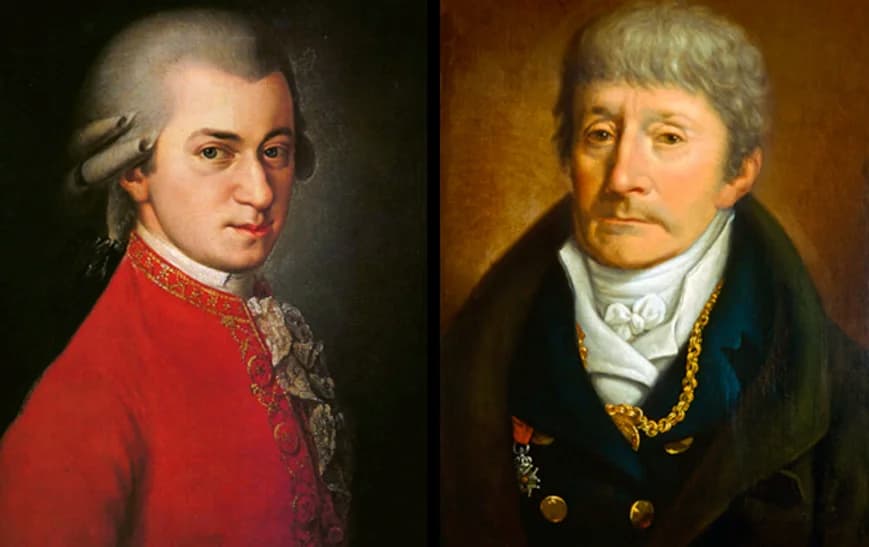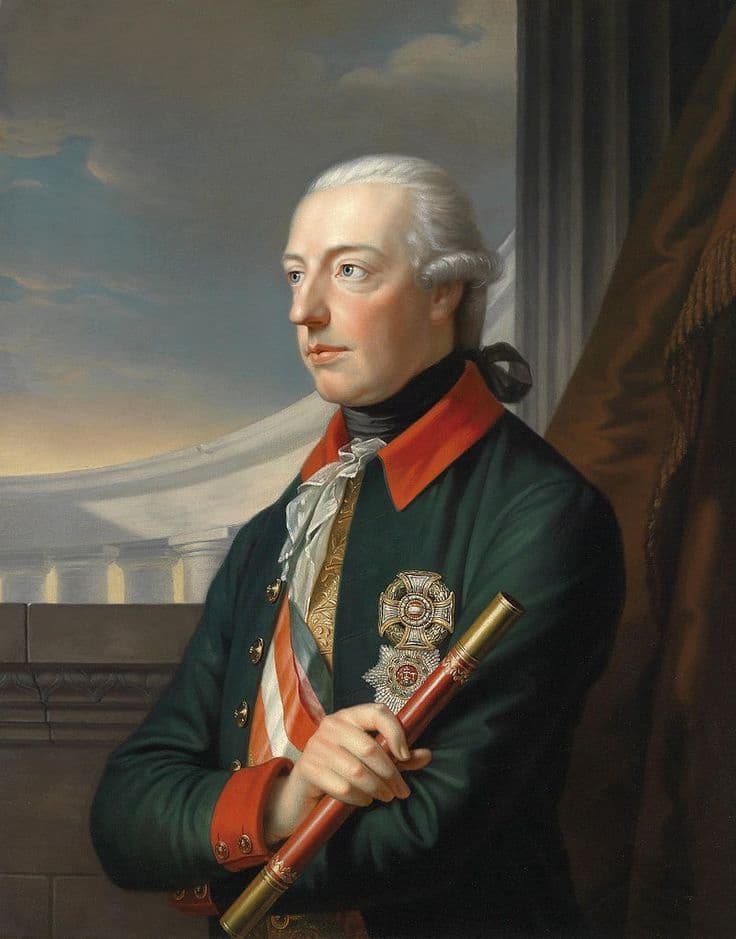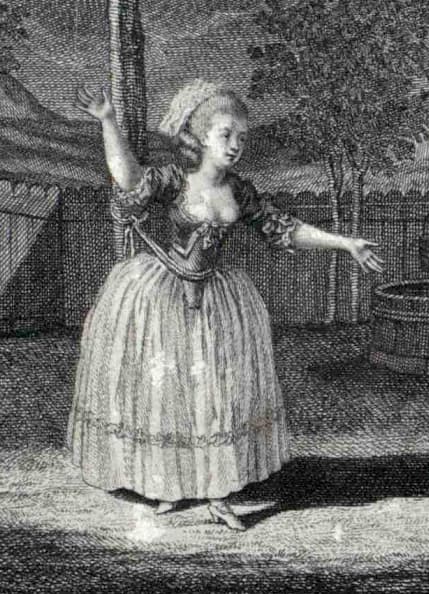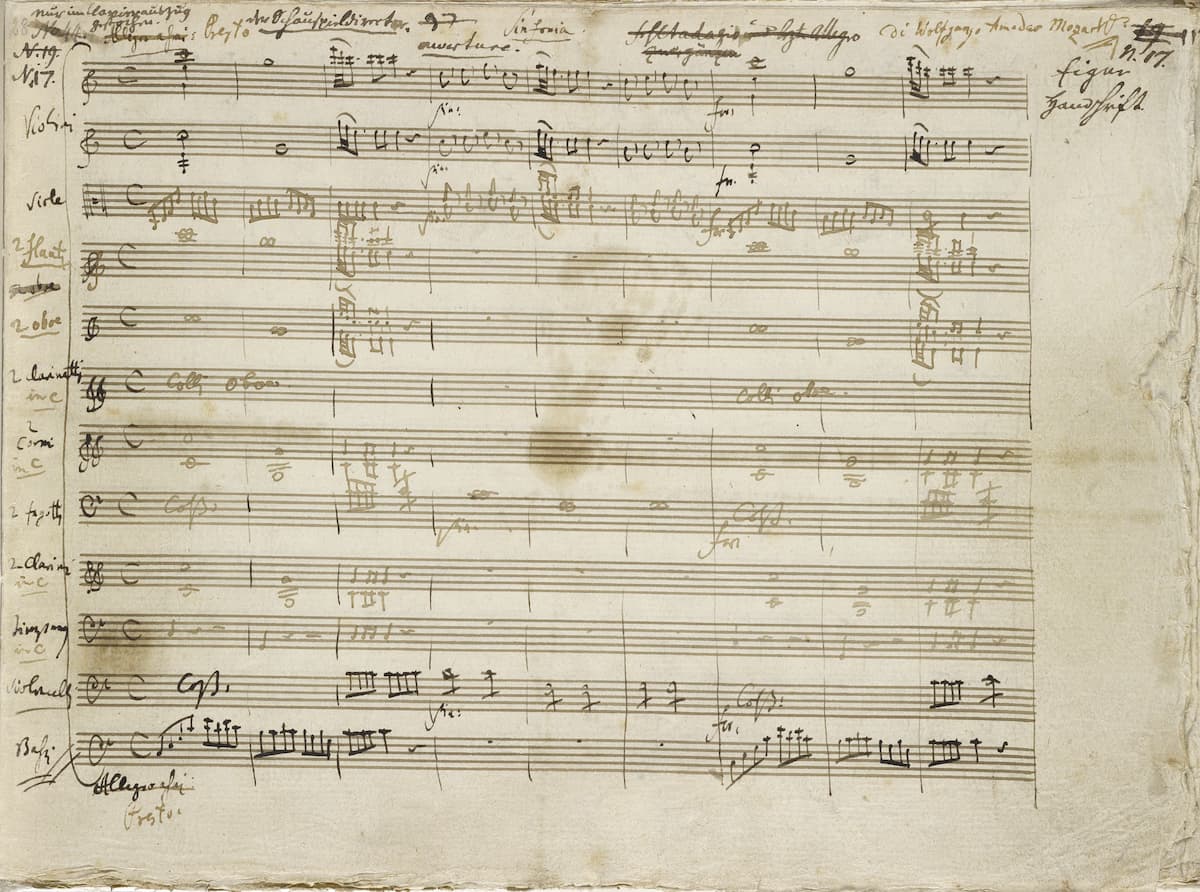On 7 February 1786, the Schönbrunn castle on the outskirts of Vienna saw the premiere performance of Mozart’s Schauspieldirektor (The Impresario). On the same playbill was Antonio Salieri’s Prima la Musica, poi le Parole (First the Music and then the Words). Both works were commissioned by Emperor Joseph II in direct competition between Salieri’s fashionable Italian operatic style and Mozart’s attempt at German opera.
Wolfgang Amadeus Mozart: Schauspieldirektor, K. 486 “Overture”
The Performance

Wolfgang Amadeus Mozart and Antonio Salieri © slavicwritings.com
An eyewitness reports, “His Imperial Majesty was escorted by her Highness the Archduchess Christine. They left the Imperial residence at 3 pm for Schönbrunn and alighted at the Orangerie, which was arranged for the reception of the guests and for luncheon in the most charming manner. While the distinguished foreign and other guests were dining, the Imperial and Royal Court chamber orchestra performed on wind instruments. At the conclusion of the meal, the actors of the Imperial and Royal National Theatre went to work.”
The emperor had provided the same subject to both composers, dealing with the creation of an opera and the establishment of an opera company. Gottlieb Stephanie, an Austrian playwright, director, and librettist, designed a scenario on “The Vanity of Singers” that featured a number of spoken roles.
Wolfgang Amadeus Mozart: Schauspieldirektor, K. 486 “Da schlägt die Abschiedsstunde”
The Scenario

Emperor Joseph II
The impresario Frank, a role originally taken by Gottlieb Stephanie himself, and the buffo singer “Buff” are auditioning two actresses as part of setting up a new theatrical company. They first listen to Mme Herz, a soprano role taken by Aloysia Weber, who offers an aria in the pathetic style with a brilliant conclusion. Then Mlle Silberklang, sung by Salieri’s mistress Caterina Cavalieri, auditions with an elegant and bright rondo.
Both singers are hired, but they begin to argue over who will get the prima donna role and who will be paid the most. To illustrate their strengths, each sings a striking aria to back her claim. As the competition threatens to get out of hand, the tenor Vogelsang intervenes. Eventually, a compromise is reached, and both will receive “large salaries and star billing.” The work concludes with a quartet suggesting that every artist strives for glory.
Wolfgang Amadeus Mozart: Schauspieldirektor, K. 486, “Bester Jüngling”
Disappointment for the Emperor
The emperor had probably hoped that Mozart and German opera would win the day, but in the end, the evening was a resounding triumph for Salieri and Italian opera. As a scholar writes, “Mozart’s buffoonery about German theatre folk was simply no match for Salieri’s sophisticated consideration of the relation of music and poetry.”

Caterina Cavalieri, 1779
By imperial decree, the newly created German Opera had pitted itself against the Italian opera buffa to prove its viability and had been soundly defeated. Mozart, however, had taken this challenge seriously and for this “comedy with music” even stopped work on Le nozze di Figaro.
Wolfgang Amadeus Mozart: Schauspieldirektor, K. 486 “Ich bin die erste Sängerin”
Concurrently with Figaro
Mozart had been eager to produce an Italian opera in Vienna, and now that he had a real commission and Da Ponte’s fine libretto for Figaro, “the commission to compose The Impresario, must have felt like a distraction.” In addition, he was confronted with a poor libretto with overly long spoken dialogue.

Mozart’s Schauspieldirektor autograph
The original German dialogue has largely been excised in modern performance. Today, you are most likely to hear it with modernized and translated text to make it more accessible for a modern audience. For Mozart, The Impresario commission provided some money, although his fee was only half that of Salieri’s. However, with this lighter German singspiel, Mozart was able to place his name before the public as an opera composer.
For more of the best in classical music, sign up for our E-Newsletter
